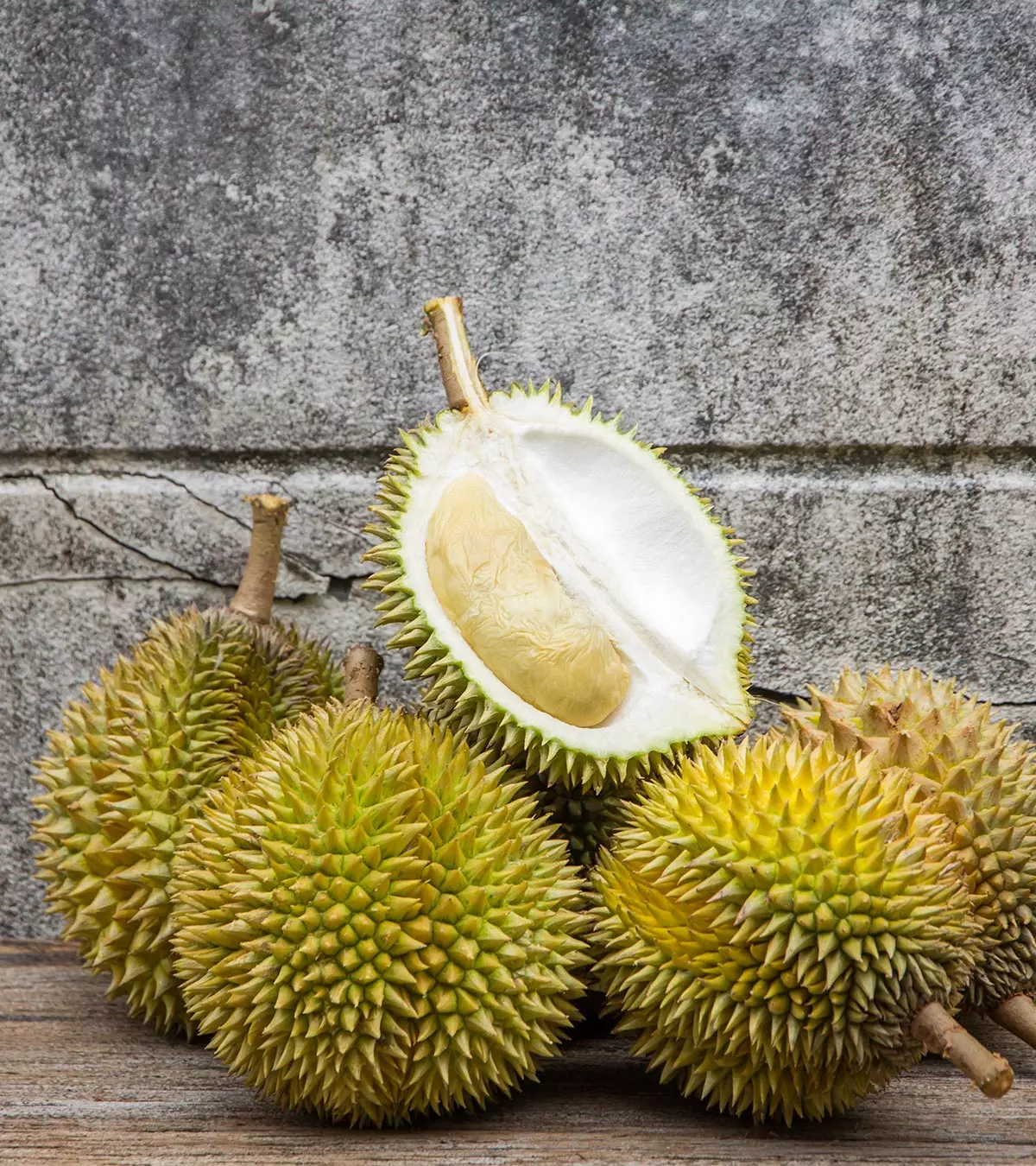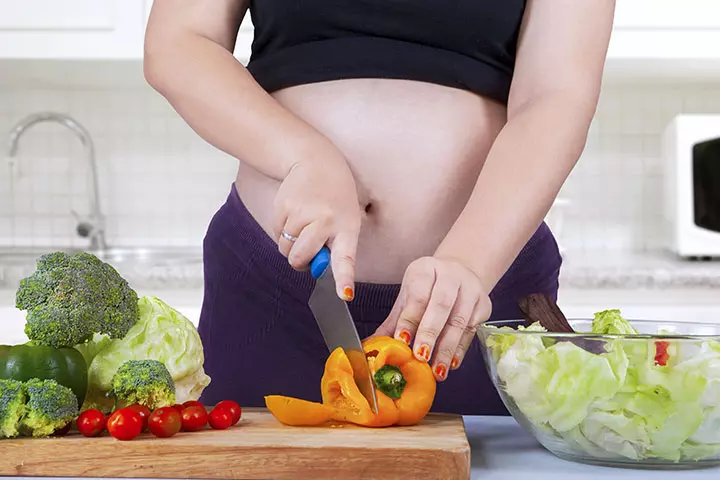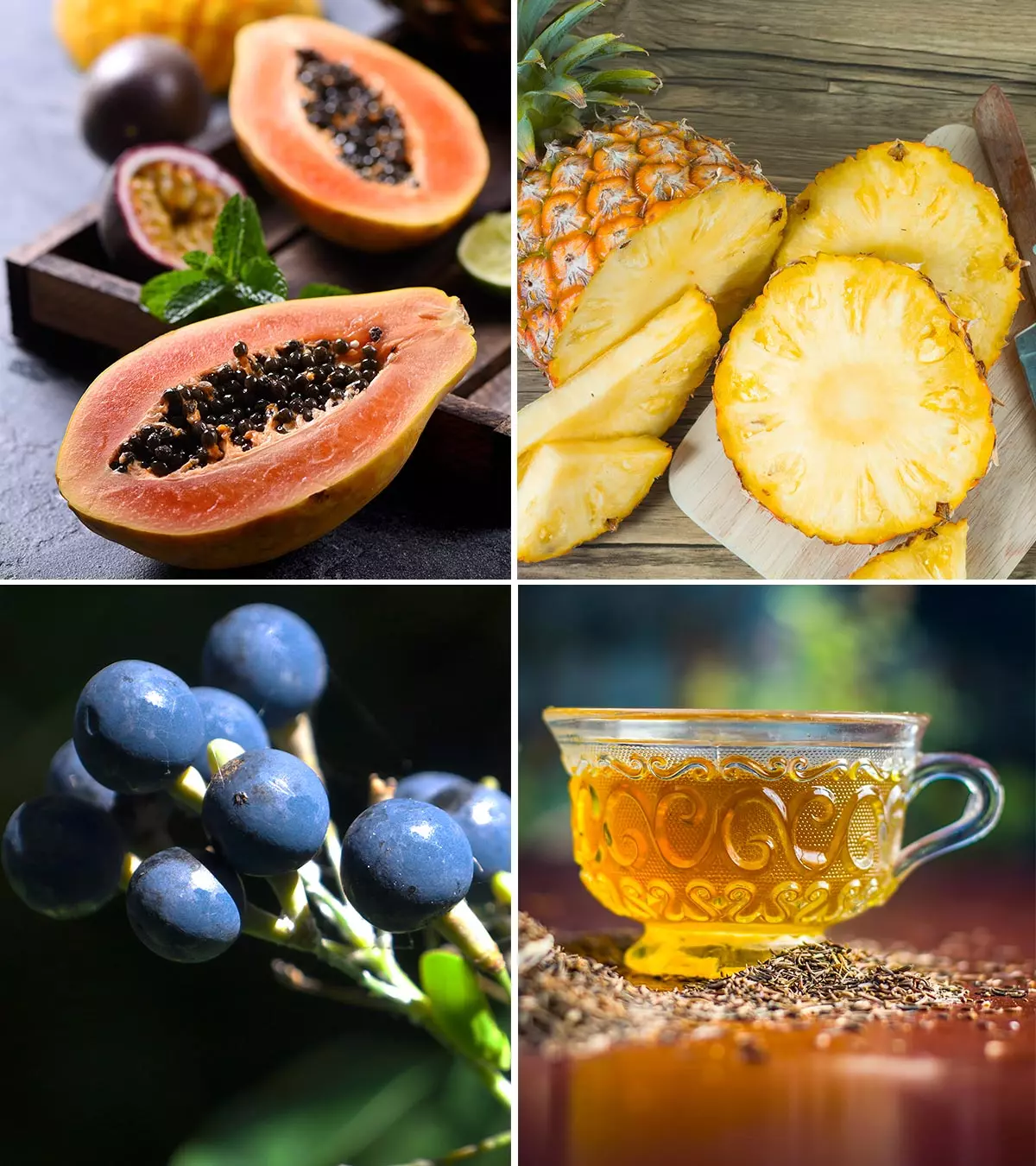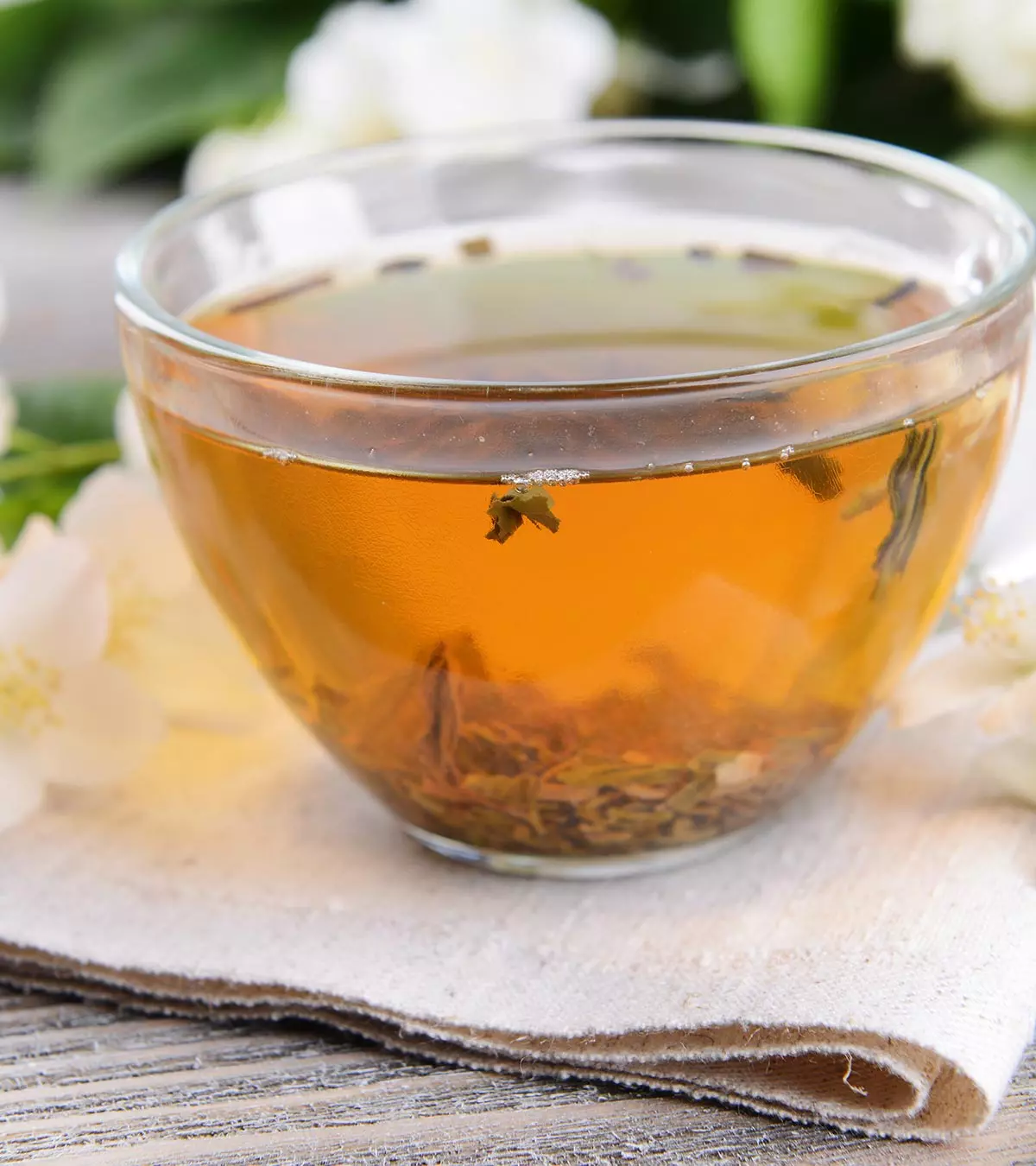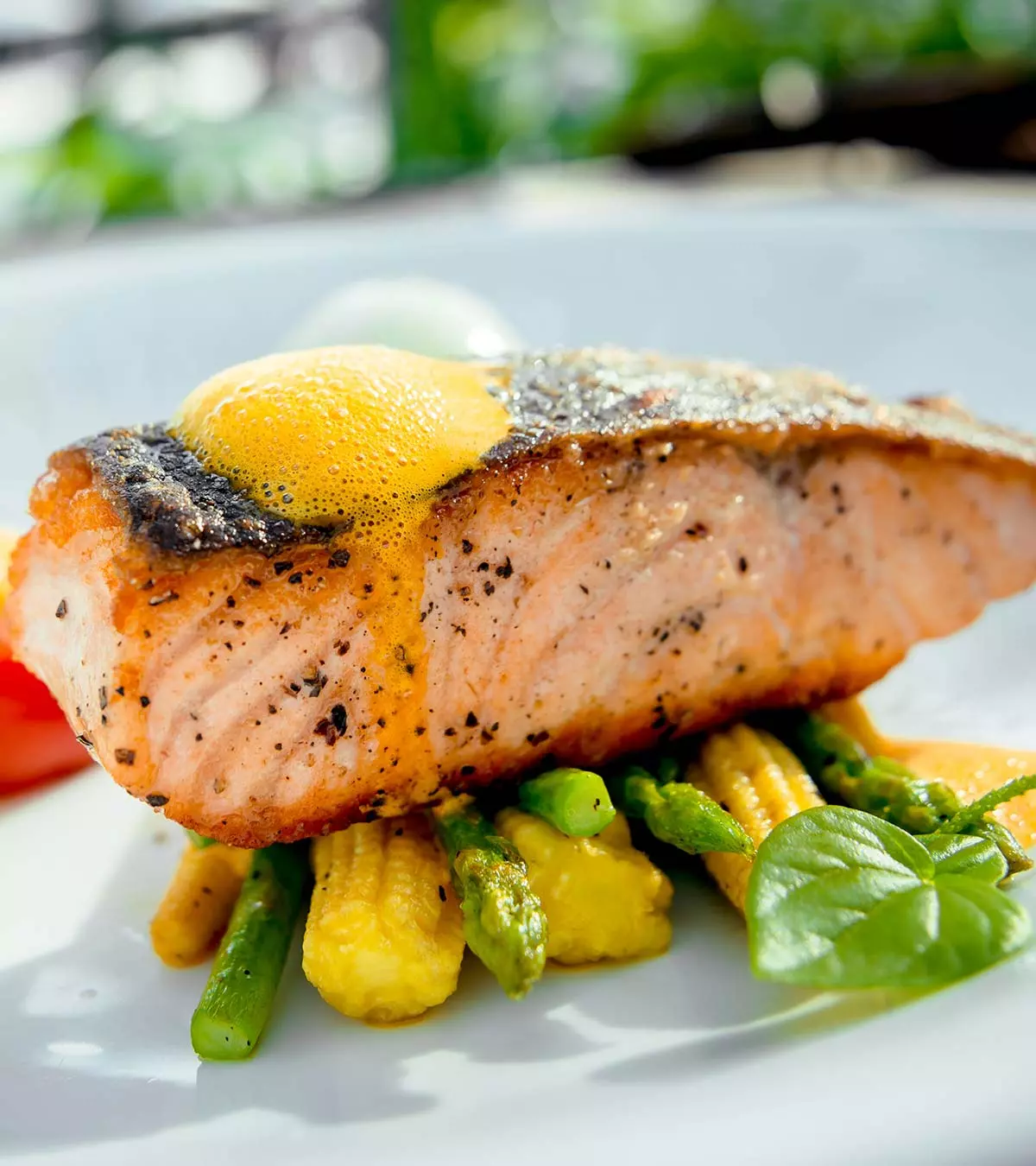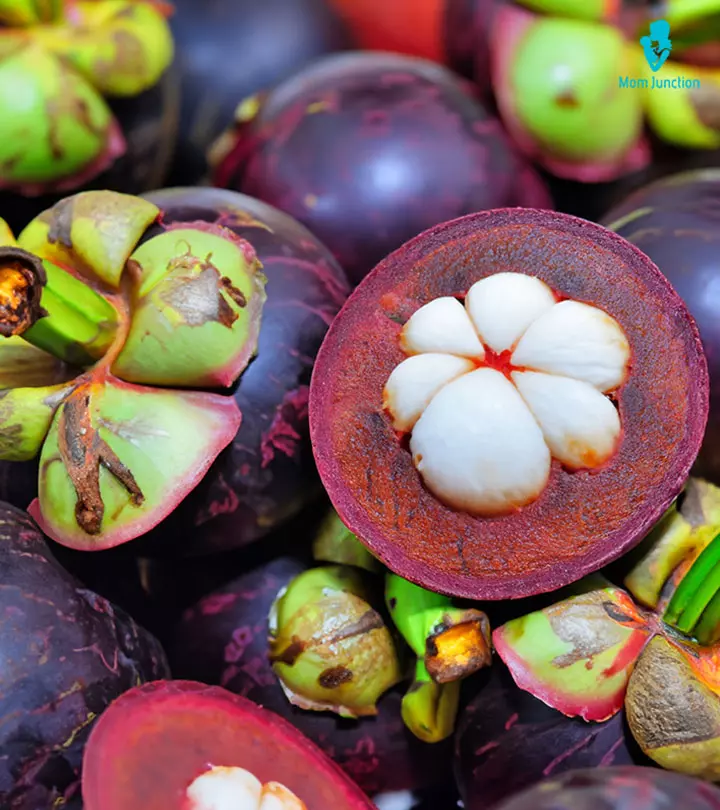
Image: Midjourney/ MomJunction Design Team
Mangosteen is a colorful fruit with high nutritional value and is mostly grown in Southeast Asia. With a blend of sweet and sour flavors, mangosteen during pregnancy is sure to tingle your taste buds. This fruit is quite beneficial for both the expecting mother and the baby. It is believed to cure common pregnancy-related digestive problems, such as constipation, and may reduce the risk of congenital disabilities. Scroll through to learn more about mangosteen, including its safety and health benefits during pregnancy.

Key Pointers
- Mangosteen is a flavorful fruit that benefits the expecting mother and the fetus when consumed in limited amounts.
- Antioxidants, minerals, and vitamins present in the fruit aid in growth and protect the baby from congenital disabilities.
- High amounts of vitamin C boost immunity, and the fiber content helps fight constipation.
- Mangosteen may increase the risk of bleeding and is advised to be avoided before and after delivery.
- Pregnant women should consult a healthcare professional before consuming mangosteen or any other supplement.
What Is A Mangosteen?
Mangosteen, scientifically popular as Garcinia mangostana, belongs to the family of Clusiaceae. The juicy fruit is purple in color and native to Thailand. The fruit is also popular as ‘queen of tropical fruits’, particularly in the southeast areas of Asia. The round, exotic fruit is full of nutrients that are beneficial for the fetus as well as expecting mother (1).
Nutritional Profile Of Mangosteen
Mangosteen is rich in essential nutrients that can contribute to overall health during pregnancy. Here is the nutritional composition of one cup (196g) of drained, canned mangosteen (11).
| NUTRIENT | UNIT PER CUP (196g) |
|---|---|
| Energy | 143kcal |
| Carbohydrates | 35.1g |
| Fiber | 3.53g |
| Calcium (Ca) | 23.5mg |
| Iron (Fe) | 0.588mg |
| Magnesium (Mg) | 25.5mg |
| Phosphorus (P) | 15.7mg |
| Potassium (K) | 94.1mg |
| Zinc (Zn) | 0.412mg |
| Manganese (Mn) | 0.2mg |
| Vitamin C (Ascorbic acid) | 5.68mg |
| Folate | 60.8µg |
| Vitamin A | 68.6IU |
Source: US Food And Drug Administration
Is It Safe To Eat Mangosteen During Pregnancy?
Registered dietitian Alicia Chacha Miller says, “Mangosteen is rich in beneficial nutrients for pregnancy like folate (which helps prevent neural tube defects), and vitamin C to support immune system function. While there isn’t a lot of research on the safety of consuming mangosteen during pregnancy, it is likely well-tolerated by most expecting mothers when consumed in moderation.”
There is little scientific information about the safety of eating mangosteen during pregnancy. The fruit has nutrients, such as minerals, vitamins, and folate, which can promote the healthy growth of the fetus and also keep the mother nourished. If you wish to consume the fruit during pregnancy, check with your doctor if it is okay, especially if you are eating it for the first time or after a long time. Avoid using medications or preparations containing mangosteen rind, as it may affect your fetus (2).
 Did you know?
Did you know?Infographic: Benefits Of Consuming Mangosteen In Pregnancy

Illustration: Momjunction Design Team
6 Health Benefits Of Mangosteen During Pregnancy
Since mangosteen is a rich source of several nutrients, it offers you many health benefits during pregnancy. Find below some prominent mangosteen benefits for pregnancy:
1. Lessen The Risk Of Birth Defects In Fetus
Mangosteen contains a good amount of folate.
One cup of mangosteen contains 61 micrograms of folate. Folate plays a crucial role in preventing the risk of development of certain abnormalities and birth defects, such as brain and spinal birth defects, in your unborn baby. Studies indicate that an intake of 4mg of folic acid per day during early pregnancy can reduce the risk of neural tube defects by 70 percent even in cases of prior NTD-affected pregnancies (12) (13). So, eating mangosteen during pregnancy protects your fetus from the risk of abnormalities (3).
2. Promotes Fetal Growth
Mangosteen is a rich source of mineral manganese that is a vital nutrient necessary for the process of formation of cartilage and skeletal system in your fetus. The fruit promotes the growth of your unborn baby. Just one cup of fresh mangosteen juice during pregnancy provides you about 0.2 mg of manganese. Also, antioxidant properties of mangosteen safeguard you as well as your fetus from cell damage (3).
3. Boosts Immunity

Mangosteen contains a good amount of vitamin C which is a crucial vitamin necessary for good health of your fetus. Just one cup of fresh mangosteen provides you about 5.7 mg of the nutrient. Vitamin C helps boost your immunity and minimize the risk of contracting harmful infections that may cause harm to your unborn baby during pregnancy. Also, the vitamin increases the production of collagen in your body which increases your skin’s elasticity to help you accommodate your growing fetus easily during pregnancy (4).
4. Protects From Cancer
Pericaps of mangosteen comprise compounds popular as xanthones that provide you anti-cancer benefits. Xanthones inhibit the growth of cancerous cells in your body during pregnancy. So, the fruit protects you and your unborn baby from the hazardous effects of the deadly ailment (5).
5. Regulates Diabetes
Mangosteen is an excellent natural remedy for diabetes. Eating mangosteen in pregnancy helps you regulate your blood glucose levels effectively and protect you from hazardous effects of diabetes during pregnancy (6).
6. Treats Constipation

Medical studies reveal that greater than half of the pregnant women suffer from constipation troubles while expecting. Eating fresh mangosteen can help mitigate the discomfort resulting due to constipation during pregnancy. Just one cup of the fruit provides you about 3.5 grams of fiber that helps promote smooth bowel movements. Also, fiber in mangosteen minimizes the risk of pregnancy complications such as preeclampsia (7).
Ways To Include Mangosteen In Pregnancy Diet
Since inadequate scientific information exists on the consumption limits of pregnant women, it is best to limit your intake to a quantity suggested by your doctor or dietician (8). If you’re expecting and want to savor mangosteen without any worries, there are plenty of simple ways you can try.
- Salads: Make a yummy fruit salad by tossing together some mangosteens with other fruits like lychees, dragon fruit, kiwi, and bananas. You may also make a savory salad by combining some freshly scooped mangosteen with mixed greens, cherry tomatoes, cucumber, crumbled feta cheese, and a balsamic vinaigrette.
- Smoothies: Blend mangosteen with purple lettuce, ripe bananas, and coconut milk to make a delectable and nutritious smoothie. Alternatively, you may also blend freshly scooped mangosteen with coconut milk, frozen banana, and frozen mango chunks until smooth and creamy.
- Yogurt: You may combine freshly scooped mangosteen with unflavored Greek yogurt to make a refreshing snack. You may also add some granola or chia seeds to it to make it wholesome.
- Juice: Blend peeled mangosteen chunks with water to make fresh juice at home. However, avoid consuming fruit juices in excess, as they can cause a sudden spike in blood sugar levels. It is advisable to consume whole fruit as much as possible.
 Point to consider
Point to considerFrequently Asked Questions
1. Is mangosteen good for fertility?
Animal studies show that the antioxidants present in mangosteen peel extract may help enhance sperm count and motility(9).
2. Is mangosteen acidic or alkaline?
Mangosteen is considered moderately acidic in nature (10).
3. Are there any potential risks or side effects associated with consuming mangosteen during pregnancy?
Mangosteen is a nutritious fruit considered safe to consume in moderate amounts during pregnancy. However, like any other food, it may have some risks or side effects, such as allergies or medication interactions. Its high fiber content and certain compounds can cause digestive issues in sensitive individuals. It may also interact with blood thinners and similar supplements to slow clotting, increasing the risk of bleeding out (8). Therefore, it is vital to talk to a doctor or nutrition expert before adding mangosteen to your pregnancy diet.
4. Can mangosteen help with common pregnancy symptoms like morning sickness or fatigue?
Anecdotal evidence suggests that antioxidants and anti-inflammatory agents in mangosteen can help relieve morning sickness and fatigue. However, scientific evidence supporting these claims is scarce.
Mangosteen, a juicy, sweet fruit, is known to be a pregnancy craving some women indulge in. It is rich in nutrients and can have several health benefits for the developing fetus and the pregnant woman. For example, it helps reduce the risk of congenital anomalies and regulates diabetes. Thus, consuming mangosteen during pregnancy is considered safe. However, check with your gynecologist about how much mangosteen you can safely consume and also the best fruits to eat during pregnancy. Further, avoid using mangosteen supplements before checking with your doctor, and opt for the fruit instead.
Illustration: Fantastic Benefits Of Eating Mangosteen During Pregnancy
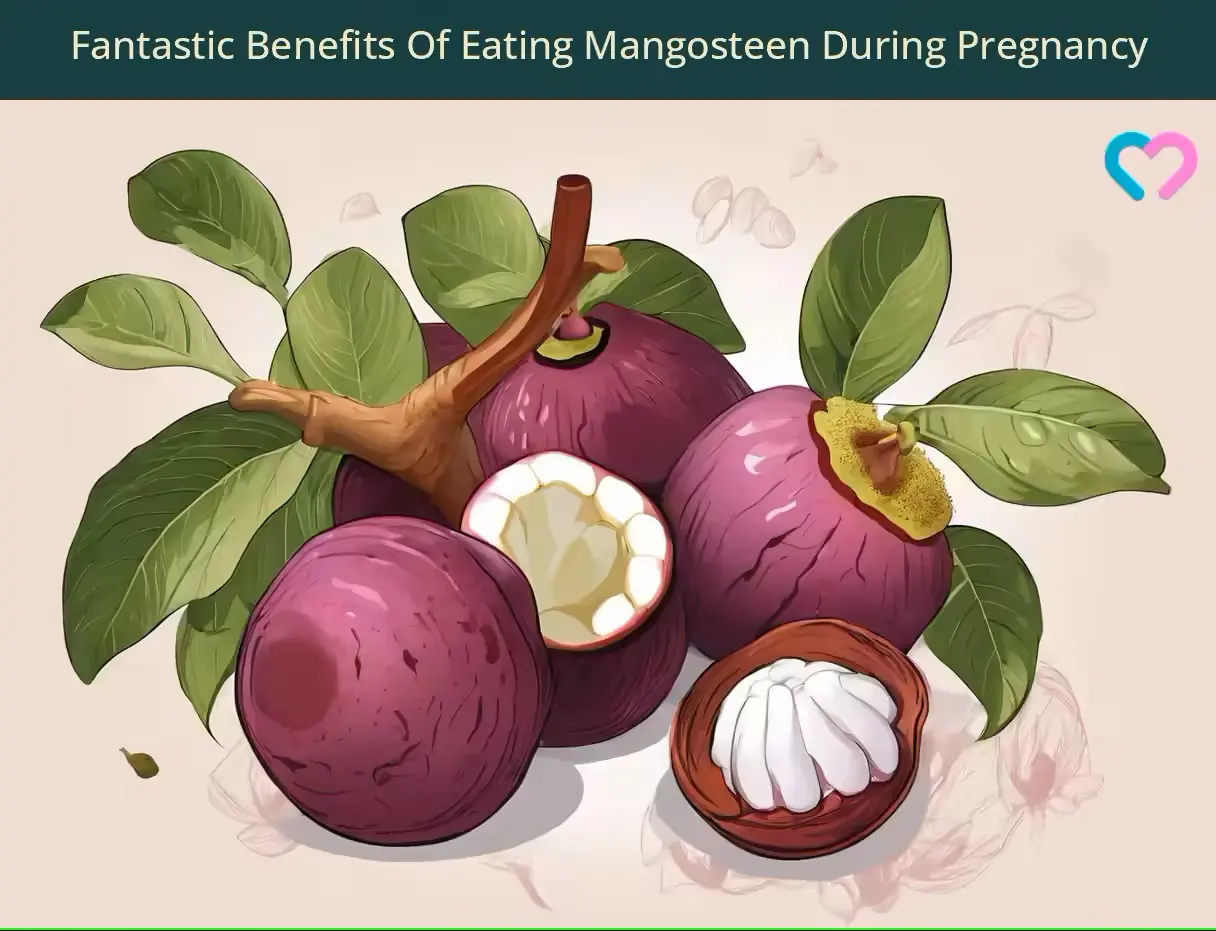
Image: Stable Diffusion/MomJunction Design Team
References
- Mangosteen.
https://www.darwin.nt.gov.au/sites/default/files/old_7_publications_files/mangosteen_0.pdf - Ernst Schmidt et al.; Trees and Shrubs of Mpumalanga and Kruger National Park.
https://books.google.co.in/books? id=RpVJJH3kV0oC&pg=PA424&dq=mangosteen+pregnancy&hl=en&sa=X&ved=0CD0Q6AEwA2oVChMI8beezc_9yAIVh5GOCh1TmghJ#v=onepage&q=mangosteen%20pregnancy&f=false - M. Usman and John Davidson; Health Benefits of Mangosteens.
https://books.google.co.in/books?id=wZ-tBgAAQBAJ&pg=PA9&dq=mangosteen+folate&hl=en&sa=X&ved=0CCgQ6AEwAWoVChMI8PrMsIL-yAIVFQmOCh2Fgg0V#v=onepage&q=mangosteen%20folate&f=false - Patricia Conlin; ABCs of Food: Boost Your Energy, Confidence and Success with the Power of Nutrition.
https://books.google.co.in/books?id=niYqBgAAQBAJ&pg=PT157&dq=mangosteen+contains+folate&hl=en&sa=X&ved=0CCIQ6AEwAWoVChMIoP7aqYH-yAIVg8KOCh0h_gYS#v=onepage&q=mangosteen%20contains%20folate&f=false - T. Shan et al.; (2011); Xanthones from Mangosteen Extracts as Natural Chemopreventive Agents: Potential Anticancer Drugs.
https://www.ncbi.nlm.nih.gov/pmc/articles/PMC3237908/ - Samir Devalaraja et al.; (2012); Exotic Fruits as Therapeutic Complements for Diabetes, Obesity and Metabolic Syndrome.
https://www.ncbi.nlm.nih.gov/pmc/articles/PMC3156450/ - Encyclopedia of Food and Health.
https://books.google.co.in/books?id=O-t9BAAAQBAJ&pg=RA2-PA141&dq=mangosteen+treats+constipation&hl=en&sa=X&ved=0CBsQ6AEwAGoVChMIjJyV64D-yAIVRh-OCh0mSQYV#v=onepage&q=mangosteen%20treats%20constipation&f=false - Mangosteen.
https://medlineplus.gov/druginfo/natural/1081.html - Ardi Prawira et al.; (2015); The Effect of Mangosteen Peel Extract on Sperm Motility and Sperm Count of Swiss Webster Mice Induced by Hard Physical Exercise.
https://journal.maranatha.edu/index.php/jmh/article/view/503 - Alkaline Food Chart- Becoming Alkaline.
https://www.mdpi.com/2072-6643/5/8/3163 - Mangosteen, canned, syrup pack.
https://fdc.nal.usda.gov/fdc-app.html#/food-details/169090/nutrients - Folic Acid: the Vitamin That Helps Prevent Birth Defects.
https://www.health.ny.gov/publications/1335/ - Recommendations for the Use of Folic Acid to Reduce the Number of Cases of Spina Bifida and Other Neural Tube Defects.
https://www.cdc.gov/mmwr/preview/mmwrhtml/00019479.htm#:~:text=high%2Ddose%20folic%20acid%20supplements%20(4.0%20mg%20per%20day)%20used%20by%20women%20who%20had%20a%20prior%20NTD%2Daffected%20pregnancy%20reduced%20the%20risk%20of%20having%20a%20subsequent%20NTD%2Daffected%20pregnancy%20by%2070%25.
Community Experiences
Join the conversation and become a part of our nurturing community! Share your stories, experiences, and insights to connect with fellow parents.
Read full bio of Jyoti Benjamin
- Alicia Chacha Miller is a registered dietitian specializing in maternal and pediatric nutrition. She holds an MS in Nutrition Science from the University of Southern California and founded Cardamom Nutrition.
 Alicia Chacha Miller is a registered dietitian specializing in maternal and pediatric nutrition. She holds an MS in Nutrition Science from the University of Southern California and founded Cardamom Nutrition.
Alicia Chacha Miller is a registered dietitian specializing in maternal and pediatric nutrition. She holds an MS in Nutrition Science from the University of Southern California and founded Cardamom Nutrition.
Read full bio of Ria Saha
Read full bio of Swati Patwal
Read full bio of Lorraine Teron







